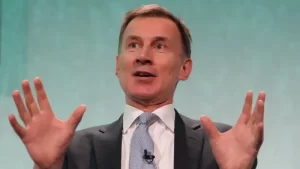 IMF warns UK government against further tax cuts
IMF warns UK government against further tax cuts
The International Monetary Fund (IMF) has “advised the UK against further tax cuts”, as it launched its latest assessment of the world economy.
It said preserving public services and investment implied higher spending than was reflected in the government’s current plans.
The IMF suggested the Treasury’s pencilled-in spending cuts from this year were unrealistic.
Chancellor Jeremy Hunt said tax cuts could be a big help in boosting growth.
Mr Hunt has hinted heavily about more tax cuts in his upcoming Budget in March.
The IMF is an international organisation with 190 member countries, including the UK. They work together to try to stabilise the global economy.
One of the Fund’s jobs is to advise its members on how to improve their economies.
The latest comments from the IMF came as it downgraded its forecasts for UK growth next year from 2% to 1.6%, partly as a statistical consequence of growth having been revised higher during the pandemic years. This better performance leaves less room for growth to catch up in later years.
The UK’s growth last year and this year is expected to remain sluggish at below 0.5% and 0.6% respectively, the second-slowest in the G7 major economies, behind Germany.
The IMF also assumes fewer Bank of England rate cuts than in financial markets, calculating that rates will remain at 5.25% in the first half of this year. The Bank is then expected to cut by half a per cent over the second half of the year.
Treasury sources said the government was slapping down the IMF for its advice on tax cuts, which derives from the organisation’s research for its annual in-depth health check of the UK economy.
It comes at a sensitive time ahead of the Budget and a general election where the chancellor hopes to mark out a key dividing line with the opposition on a smaller state, with lower public spending and lower taxes. The Treasury sources said that the improvement in UK growth prospects arose because of the chancellor’s targeted business investment tax cuts.
